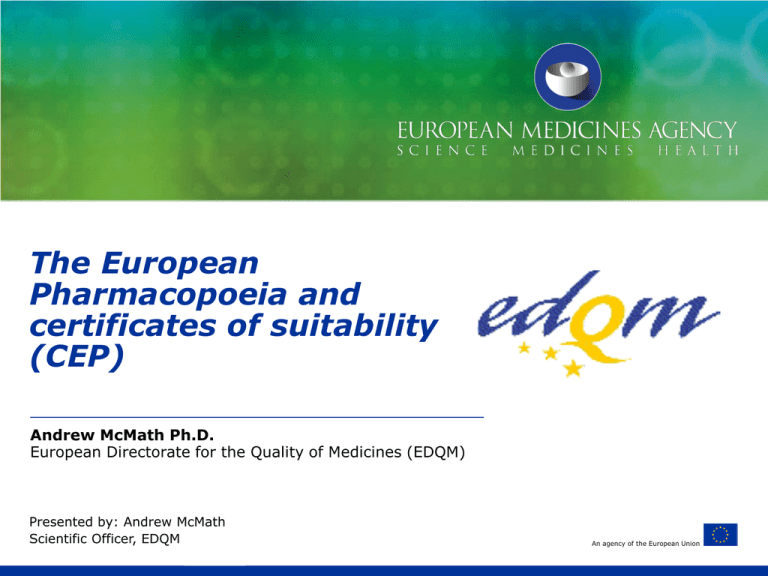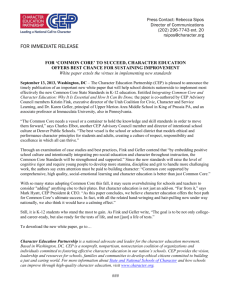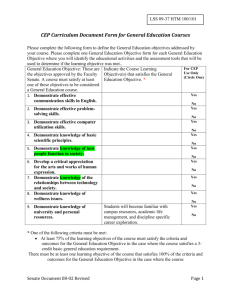The European Pharmacopoeia and certificates of suitability (CEP)
advertisement

The European Pharmacopoeia and certificates of suitability (CEP) Your Logo Andrew McMath Ph.D. European Directorate for the Quality of Medicines (EDQM) Presented by: Andrew McMath Scientific Officer, EDQM An agency of the European Union European Directorate for the Quality of Medicines & HealthCare (EDQM) A Council of Europe Directorate, based on the Convention on the Elaboration of a European Pharmacopoeia (PA, 1964) Mission: to contribute to a basic human right: access to good quality medicines and healthcare 1 The European Pharmacopoeia and certificates of suitability (CEP) European Pharmacopoeia (Ph. Eur.) •Protecting public health - one common compulsory standard. • The Ph. Eur. is the official pharmacopoeia in Europe – complemented by national pharmacopoeias for texts of interest to only one Member State. • Mandatory at the same date in 37 Member States (CoE) and the EU. • 2 Legally binding quality standards for ALL medicinal products in its member states, i.e. raw material, preparations, dosage forms, containers must comply with the Ph. Eur. requirements when they exist. The European Pharmacopoeia and certificates of suitability (CEP) European Pharmacopoeia Monographs Today • Active substances (organic, inorganic) • Excipients • Substances of biological origin and biotechnology (insulin, somatropin...) • Herbal drugs, essential oils and fats, preparations • Radiopharmaceuticals • Vaccines, sera (human, veterinary), blood derivatives • Homeopathic preparations • General monographs on dosage forms • General texts on quality issues and standard analytical methods ⇒ More than 2200 monographs 3 The European Pharmacopoeia and certificates of suitability (CEP) General Notices Put at the very beginning of the Ph. Eur., they address general issues and are aimed at providing basic information to the user. ► Apply to all texts ► Rules to understand texts, conventional expressions Essential reading before starting to use Monographs 4 The European Pharmacopoeia and certificates of suitability (CEP) Flexibility in the Ph.Eur. -Alternative methods • Ph. Eur. tests are reference methods, essential in cases of dispute. • Compliance is required, but alternative methods may be used as long as they lead to the same pass/fail result. It is the responsibility of the user to demonstrate their suitability. Approval of the competent authority is necessary in many cases. 5 The European Pharmacopoeia and certificates of suitability (CEP) Flexibility in the Ph.Eur. – General Notices “An article is not of Pharmacopoeia quality unless it complies with all the requirements stated in the monograph. This does not imply that performance of all the tests in a monograph is necessarily a prerequisite for a manufacturer in assessing compliance with the Pharmacopoeia before release of a product….. An enhanced approach to quality control could utilise process analytical technology (PAT) and/or real-time release testing (including parametric release) strategies as alternatives to end-product testing alone.” (Suppl. 8.2.) 6 The European Pharmacopoeia and certificates of suitability (CEP) What does compliance mean? • Compliance with a monograph • All mandatory parts of a monograph. • Compliance until time of use for raw materials, ingredients. • Compliance throughout period of validity for preparations. • In-use compliance decided by licensing authority for each preparation. 7 The European Pharmacopoeia and certificates of suitability (CEP) What must comply? • Mandatory for all substances for pharmaceutical use • Ingredients (incl. excipients) of final formulation • Components of solvents, buffers etc. in or used to make up final formulation • Reagents? Not usually needed for upstream use 8 The European Pharmacopoeia and certificates of suitability (CEP) Validation of Pharmacopoeial methods The test methods …. have been validated ….. Unless otherwise stated in the monograph or general chapter, validation of the test methods by the analyst is not required.” “When implementing a pharmacopoeial method, the user must assess if and to what extent the suitability of the method under the actual conditions of use needs to be demonstrated « 8th edition 9 The European Pharmacopoeia and certificates of suitability (CEP) Why general chapters? Analytical methods: • Editorial convenience: avoid repeating standard methods in each monograph • Provide standard methods that can be used where there is no monograph • Give general requirements for equipment, equipment verification • Not mandatory “per se” but when referred to in a monograph, they become part of the standard Also other types of general chapters… 10 The European Pharmacopoeia and certificates of suitability (CEP) Examples Chapter 5.10 Control of impurities in substances for pharmaceutical use cross referenced in General monograph 2034 Substances for pharmaceutical use chapter 5.10 is to be applied to all API (whether or not an individual monograph exists in the Ph. Eur.) Chapter 5.2.8 Minimising the risk of transmitting animal spongiform encephalopathy agents via human and veterinary medicinal products creation of General monograph 1483Products with risk of transmitting agents of animal spongiform encephalopathies which cross-references the chapter 5.2.8 chapter 5.2.8 is legally binding 11 The European Pharmacopoeia and certificates of suitability (CEP) International Harmonisation • • Pharmacopoeial Discussion Group (PDG): an informal structure (members: JP, Ph. Eur., USP + WHO as observer) to arrive at interchangeable methods or requirements. Aim of harmonisation of general chapters: • PDG procedure: http://www.edqm.eu/medias/fichiers/Working_Procedures_of_the_PDG.pdf • PDG state of work: http://pharmeuropa.edqm.eu/home/menupage/English/Pharmacopoeial%20Ha rmonisation/PDG_State_of_Work_E.pdf 12 The European Pharmacopoeia and certificates of suitability (CEP) Why general monographs? Two types: • General monographs on classes of substances • General monographs on dosage forms • Apply to all products (“General monographs apply to all substances and preparations within the scope of the Definition section of the general monograph, except where a preamble limits the application, for example to substances and preparations that are the subject of a monograph of the pharmacopoeia.” General notices) • No cross-reference in individual monographs CHECK WHICH GENERAL MONOGRAPH APPLIES! 13 The European Pharmacopoeia and certificates of suitability (CEP) General monographs (cont.) • “Classes” defined by different criteria: production method, origin, risk factors • Aspects that cannot be treated in each individual monograph 14 Residual solvents TSE/BSE Pesticides in herbals etc. … The European Pharmacopoeia and certificates of suitability (CEP) Which has priority, a general monograph or an individual monograph? • Basic principle is that general and individual monographs are complementary and one does not overrule the other. • Exceptions are clearly indicated either in the general monograph or in the individual one. 15 The European Pharmacopoeia and certificates of suitability (CEP) Substances for pharmaceutical use (2034) • Requirements laid down in this general monograph apply to all substances for pharmaceutical use whether or not the substance is covered by an invidual monograph. • “Where a substance for pharmaceutical use not described in an individual monograph of the Pharmacopoeia is used in a medicinal product prepared for the special needs of individual patients, the need for compliance with the present general monograph is decided in the light of a risk assessment that takes account of the available quality of the substance and its intended use”. 16 The European Pharmacopoeia and certificates of suitability (CEP) Pharmaceutical Preparations (2619) • reference source of standards in the European Pharmacopoeia on active substances, excipients and dosage forms, which are to be applied in the manufacture/preparation of pharmaceuticals, but not a guide on how to manufacture as there is specific guidance available covering methods of manufacture and associated controls. • does not cover investigational medicinal products, but competent authorities may refer to pharmacopoeial standards when authorising clinical trials using investigational medicinal products. 17 The European Pharmacopoeia and certificates of suitability (CEP) General monographs on dosage forms • Contain requirements common to all dosage forms of the type defined (tablets, capsules, parenteral preparations, etc.) • Classified by pharmaceutical form/route of administration • Applied during licensing • Framework specification: acceptance criteria and extra tests are proposed by manufacturer and approved by competent authority 18 The European Pharmacopoeia and certificates of suitability (CEP) The Certification Procedure • To demonstrate that the quality of a substance is controlled by the Ph. Eur. monograph and additional tests if needed (“Chemical CEP” or “Herbal CEP”) • To guarantee compliance with the general monograph on Products with TSE risk (“TSE CEP”) 19 The European Pharmacopoeia and certificates of suitability (CEP) The Certification Procedure (cont.) •CEPs are accepted in 37 Member States + EU, and beyond (e.g. Canada, Australia, Singapore, South Africa, etc.) •Directive 2003/63/EC: Where the active substance and/or raw and starting material or excipient(s) are the subject of a monograph of the EP, the applicant can apply for a certificate of suitability that, where granted by the EDQM, shall be presented in the relevant section of the Module. Those certificates of suitability …are deemed to replace the relevant data of the corresponding sections described in the Module… 20 The European Pharmacopoeia and certificates of suitability (CEP) The CEP procedure (cont.) Provides: • Centralised assessment - saves time and resources • Information on the need to update Ph. Eur. monographs • Facilitates management of MAAs and variations • Application submitted directly to EDQM by the manufacturer of the pharmaceutical substance • Confidentiality of data •Governing document for the Certification procedure : •Resolution AP-CSP (07) 1 21 The European Pharmacopoeia and certificates of suitability (CEP) Scope of the CEP Procedure • Substances described in monographs in the Ph. Eur. (Active substances, excipients, herbal drugs / herbal preparations) •→ “Chemical” or “Herbal” CEP • Products with risk of TSE (SM, intermediates, reagents,..) •→ “TSE” CEP • Open to any manufacturer geographical origin 22 The European Pharmacopoeia and certificates of suitability (CEP) regardless of Out of Scope of the CEP Procedure • Substances not included in Ph. Eur. • Biologicals (PA/PH/CEP (09) 152 rev 01) • Human tissues derivatives, blood derivatives, vaccines • Mixtures of API with excipients (unless justified) • Substances which do not comply with the Definition section of the monograph • Finished products 23 The European Pharmacopoeia and certificates of suitability (CEP) How to apply for a CEP • Application form (for new application) available on the website. It contains tables to be filled in, statements and declarations to be signed • Quality Overall Summary (see template on the EDQM website) • Fees: • Electronic submissions encouraged (eCTD, NeeS, pdf) • Dossier in English (preferably) or French (see documents on the EDQM website) 24 The European Pharmacopoeia and certificates of suitability (CEP) How it works To be updated : - at any change (notification, minor/major) - after 5 years (renewal) Application Validation at receipt Request for add info Request for inspection Evaluation (2 assessors) + TAB if necessary Revision of monograph Transfer to the Ph. Eur. experts group 25 Possibility of hearing CEP granted The European Pharmacopoeia and certificates of suitability (CEP) Refusal Informing licensing authorities What does it mean? • A chemical CEP certifies that the quality of the substance is suitably controlled by the Ph. Eur. monograph with addition of tests if necessary (mentioned on the CEP) • A TSE CEP certifies that the substance complies with the EMA NfG on minimising the TSE risk. It DOES NOT certify that the quality of the substance is suitably controlled by a specific Ph. Eur. monograph • It DOES NOT replace a certificate of analysis • It IS NOT a GMP certificate 26 The European Pharmacopoeia and certificates of suitability (CEP) Certification - Inspection • Integral part of the Certification Procedure • Article 111 of Directive 2001/83/EC and Article 80 of Directive 2001/82/EC, Compilation of Community Procedures) • Performed before or after the CEP is granted • Aim: to verify the compliance with Submitted dossier EU GMP Part II EU GMP Annexes (e.g. Annex 1 / sterile substances) Actions are taken immediately after the inspection in case of major or critical deficiencies (public health issue) 27 The European Pharmacopoeia and certificates of suitability (CEP) Repartition of manufacturers (2012) 11. 22. 33. 44. 55. 28 The European Pharmacopoeia and certificates of suitability (CEP) India 222 sites China 211 sites Italy 84 sites France 65 sites Germany 60 sites Key figures • Since 1994, more than 5500 CEP applications received for 850 different substances • Currently more than 3600 valid CEPs • >1000 manufacturers from 50 different countries • These numbers change frequently as new applications are received and existing CEPs are revised daily. 29 The European Pharmacopoeia and certificates of suitability (CEP) Thank you for your attention 30 The European Pharmacopoeia and certificates of suitability (CEP)



